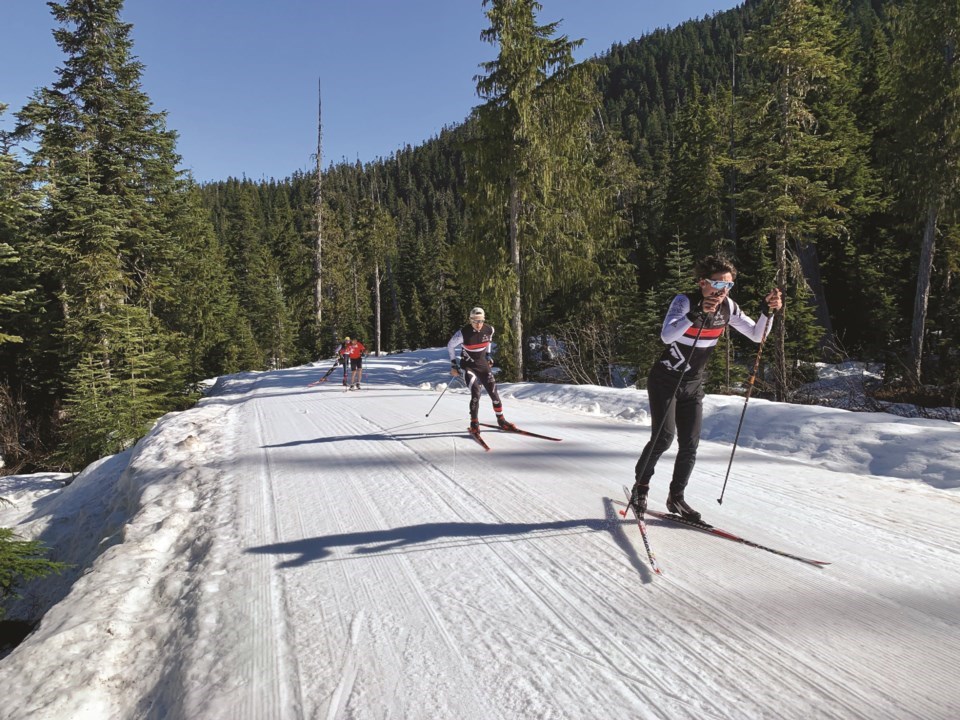Cross-country skiers in Whistler might be able to start their season a little earlier in the coming years thanks in part to the Whistler Blackcomb Foundation (WBF).
The Black Tusk Nordic Events Society (BTNES) is spearheading fundraising efforts to improve snowmaking facilities at Whistler Olympic Park, making the venue more reliable for both early season recreational skiing and on-snow training for Nordic athletes, explained Reid Carter, the society’s vice-chair.
But, according to Carter, that’s not the only benefit, as many races over the years have had to be cancelled because of insufficient snow and the “new snowmaking capability should meaningfully increase” their ability to host early season races.
The proposed snowmaking improvements are set to be carried out by Whistler Sport Legacies after receiving a major funding boost in the form of a WBF grant this month. The BTNES will receive a $100,000 grant, making it one of several local recipients in a funding cycle that resulted in the WBF doling out a total of $400,000 to non-profits looking to make a difference across the corridor.
Among the other grants awarded are:
• $65,000 to Sea to Sky Community Services for building design upgrades and walk-in support like counselling for youth at its new Foundry Youth Hub;
• $40,000 to the Whistler Adaptive Sports Program Society for a vehicle to transport adaptive sports equipment to programs throughout the Sea to Sky;
• $20,000 to the Squamish Off-Road Cycling Association for improvements to the Brennan Park Skills Park;
• $20,000 for the Howe Sound Curling Club’s environmentally-friendly Arena Heating Project;
• $18,000 to the St’at’imc Northern Tribe Powwow Society for a 15,000-seat arbour that will be used to host the community’s first annual world-class competitive powwow next summer;
• $12,000 to the Pemberton Canoe Association for new flatwater boats;
• Almost $10,000 to the Whistler Skating Club to help fund an equipment upgrade for the Can Skate Program;
• And a variety of smaller grants for various organizations across the Sea to Sky.
The funding announcement represents WBF’s return to its typical twice-yearly grant application intake periods—which open to local non-profits each April and October—after shifting gears slightly due to COVID-19.
The foundation largely abandoned its usual application process, instead collaborating with Sea to Sky groups like Whistler Community Services and the Whistler Medical Clinic, for example, to understand what locals needed most urgently, wrote WBF executive director Mei Madden in an email.
“During this period, an email or a phone call from a lot of our non-profits would be enough for us to get funds to them,” she said.
With most local organizations now back to some form of business as usual, it was “very difficult” to select grant recipients this time around, said Madden—not only because “all of the organizations have some pretty amazing projects they are working on,” but because the WBF was just as hampered by COVID-19 regulations as the organizations it strives to support.
“We often wish we could fund everything, but funding is of course dependent on how much we can raise, which we do primarily through our two major fundraising events every year,” explained Madden. “Because of the pandemic, we were somewhat limited in our fundraising abilities but our team definitely changed course and produced successful virtual and hybrid events, as well as branched out to create other programs like our mask initiative and Move for Mental Health. These allowed us to continue to support our communities during COVID.”
Pre-pandemic, the WBF was able to donate more than $1 million each year, and “during the last couple of years we were able to donate over $800,000 net annually,” Madden said.
Looking to help contribute to the next round of funding? The WBF’s annual summer fundraiser, the TELUS Golf Classic, is scheduled for Friday, Sept. 9. Details are available at whistlerblackcombfoundation.com.




